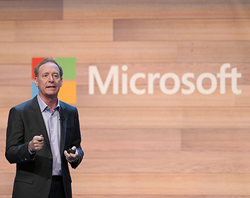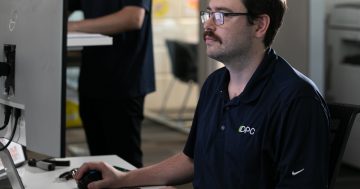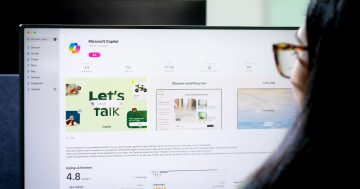Meira Gebel* says Microsoft President, Brad Smith has identified what he thinks will be the 10 biggest issues for tech to tackle in 2019.
 The tech industry is still reeling from a tumultuous 2018, as growing privacy concerns, cybersecurity threats and online disinformation campaigns have caused many people to reassess their relationship with technology.
The tech industry is still reeling from a tumultuous 2018, as growing privacy concerns, cybersecurity threats and online disinformation campaigns have caused many people to reassess their relationship with technology.
Things are only going to get more complicated as new innovations like artificial intelligence (AI) and voice recognition become increasingly commonplace in our lives.
Microsoft President, Brad Smith (pictured) outlined some of the biggest tech issues in store for us this year in a sobering blog post he recently published on LinkedIn.
Another year of public “tech-lash” seems probable, Smith writes, as society debates the roles that technology, and tech companies, play in our lives.
But there’s also an opportunity for us to confront the challenges head on, and to take steps that will help us reap the benefits of innovation while avoiding the pitfalls.
Here’s what Smith believes the top 10 tech issues will be this year:
First priority: Privacy
Smith believes privacy protection is set to gain traction globally in 2019.
For example, businesses in Europe will have to continue to find ways to interpret the General Data Protection Regulation — a 2016 law guarding the data and privacy of all those within the European Union.
And California’s new Consumer Privacy Act means the issue is becoming more widespread in that country.
Fakes news and ‘disinformation’
Social media platforms have become a preferred means for nation-states to spread disinformation.
And last year marked a “sea change” in our understanding of the problem, Smith says.
“The big question now is what will be done to address the problem,” he writes.
While social media companies have begun to acknowledge their responsibilities and accountability, Smith suggests that new laws could be used to ensure they take the issue seriously.
The US/China relationship
The tech sector could be in for a bumpy ride this year when it comes to trans-Pacific trade, Smith says.
“Across the American political spectrum there is greater appreciation of China’s momentum in artificial intelligence and other technology and heightened concern about its economic and national security implications,” writes Smith.
Smith likened the December arrest of Meng Wanzhou, the CFO of Chinese smartphone maker Huawei, to a “Netflix drama.”
Talk of export controls on emerging tech like AI, and the potential for protectionist rules limiting acquisitions by foreign companies in Europe, will become increasingly important stories to follow.
The increase of state-sponsored cyberattacks
State-sponsored cyberattacks are sure to increase, according to Smith, though are likely to be “less visible.”
At the same time, “digital diplomacy” has been spreading across the tech sector in the form of partnerships between governments, companies, and civil society groups.
The rise of activism in tech
Google abandoned a bid to work with the US military after an employee uproar over its use of AI for the military.
Other tech companies are bringing ethical questions to the table, too, Smith said, regarding those sorts of relationships.
But the thorniest ethical tech question of the day, says Smith, is facial recognition.
“Globally, this is an issue that’s just getting started.”
Will AI impact jobs?
As artificial intelligence creeps its way into our homes and phones, people are increasingly worried about its impact on the job market, according to Smith.
While those concerns are not likely go away, Smith pointed to places like Japan and South Korea where automation could help offset population declines.
“Continuing economic prosperity will require productivity advances from technology to replace a declining supply of human workers,” Smith says.
An eye on the people behind the tech
In November, the world saw Google employees walk out of work to protest the company’s handling of sexual harassment, bringing attention to an industry that has been rather silent on its treatment of women and workers’ rights.
Smith writes, “The industry has a lot more progress ahead of it than behind it.”
Immigration also has an impact on technology, as there is a “per-country limit for green cards” for workers.
Making any sort of change would require an open government.
That, he said, will take time.
Connecting rural areas
“Slower rural growth and higher unemployment often contributes to an even larger political divide,” Smith says.
And one of the biggest problems constraining rural communities is lack of high-speed broadband internet — “the electricity of the 21st century,” according to Smith.
Smith points to new projects, such as combining TV White Space technology with existing wireless systems, as one promising development that Microsoft is betting on.
Cloud storage and human rights
Governments around the world are increasingly keen to have data centres in their own countries, giving them more control over their citizens’ private data and affirming their national sovereignty.
But this trend also raises tricky questions about human rights.
“Once a local data centre is constructed, the citizenry’s most personal information can be stored within,” Smith writes.
“This raises profound questions about when a government or a tech company can access personal data and how the information can be used.”
How tech impacts cities
As tech companies grow, so do their footprints in the places they’re based.
And not always in positive ways.
This issue was most prominent during Amazon’s HQ2 bidding process, which became an international spectacle.
Rapid corporate growth must be balanced with equal attention to how community infrastructure will be impacted — like schools, transportation, and affordable housing.
“What’s good for tech companies can challenge a community,” says Smith.
Of course, this issue isn’t new to 2019.
Take a look at cities such as Seattle and San Francisco, home to a handful of tech giants, where the income divide can be seen by just walking down the street.
* Meira Gebel is a tech journalist for Business Insider. She tweets at @MeiraGebel. Her website is meiramgebel.com.
This article first appeared at www.businessinsider.com.au.











